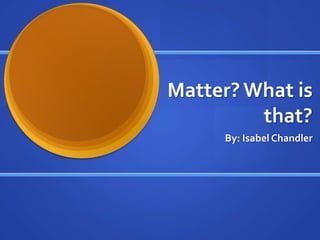
Matter
- 1. Matter? What is that? By: Isabel Chandler
- 2. Say what? Everything is made up of matter! However, it is categorized But it cannot be categorized by phase or color… Therefore…. Scientist ask 3 questions
- 3. Questions Is the matter uniformed (same) throughout? Can it be separated by chemical means? Can is be separated by physical means?
- 4. Categories
- 5. Pure Substances Can it be separated physically? No- the it’s a Compound Yes- then its an Element Made up of more than one element Water is an example H2O cannot be changed into simpler substance (heating or chemical process) Smallest particle and building block is an atom Elements on Table of Element Elements combined make million compounds Atoms vary depending on element-1 kind of element (unique)
- 6. Mixture Heterogeneous Homogeneous Look consistent Not uniform, doesn’t Particles are appear constant small, not easily recognizable Particles large enough to be seen throughout Suspension Pure Combined physically substance
- 7. Colloid A homogeneous mixture It’s particles are mixed together, but not dissolved. Particles large and are kept permanently suspended. Will not separate upon standing Often seems cloud because particles are constantly running into one another
- 8. Solution Type of homogeneous mixture Formed when a substance dissolves Best mixed of all Solute- is dissolved Solvent- does the dissolving
- 9. Separation Techniques Distillation- use of boiling point Filtration- based on particle size and solubility
- 10. Distillation A process that separates the substance in a solution based on boiling points Plateau- the point at which a line flattens out The plateau is used to determine when one substance is at its boiling point, and when there has been one substance dissolved Example: Mixture or Pure Substance? Lab
- 11. Filtration/Evaporation A process used to isolate materials based on their particle size, or solubility Put filter paper in funnel over test tube. It will isolate the liquid from the solid. Then take out the filter paper, and let it sit for the night so the remaining liquid can Evaporate.
- 12. Evaporation A process used to isolate a solid dissolved in a liquid Property- Solubility Example- NaCl and water (salt) Disclaimer (Con)- only can isolate solid (-water evaporates into air)
- 13. Chemical Changes Flammability A materials ability to burn Reactivity Hoe readily a substance combines chemically with other substances
- 14. Evidence of a Chemical Change Color change Ex; Oxidizing Production of gas Ex: Evidence of Bubbles Formation of precipitate Ex: Cottage cheese Change in temperature EXOTHERMIC/ENDOTHERMIC
- 15. Chemical vs. Physical Chemical- Composition of substance is different Physical- Composition of substance is the same
- 16. Study Questions What are the differences between a solution, suspension, and colloid?
- 17. Study Questions What is a physical property?
- 18. Study Questions What are the definitions of… Melting Point Boiling Point Density Viscosity Conductivity Malleability Hardness Odor Solubility
- 19. Study Questions How could you use physical properties to identify substances?
- 20. Student Questions How can we use physical properties to separate mixtures?
- 21. Study Questions What is a physical change
- 22. Study Questions What is a chemical change?
- 23. Study Questions What are two chemical property?
- 24. Study Questions How do you recognize a chemical change?
- 25. Study Questions Fill in the blank “__________ properties can be observed only when the substances in the sample of matter are changing into different substances.”
- 26. Study Questions What is the difference between a chemical change vs. a physical change?
- 27. Study Questions What do bubbles mean when performing an experiment?
- 28. Study Questions What is a mixture?
- 29. Study Questions What is a pure substance?
- 30. Study Questions What three questions scientist ask to categorize?
- 31. Study Questions What are these called H2O Hg Ni
- 32. Study Questions What is a bowl filled with gummy bear be called?
- 33. Study Questions What is a hetergeous mixture?
- 34. Study Questions What is homogeneous mixture?
- 35. Study Questions What are elements?
- 36. Study Questions What is compound?
- 37. Study Questions Fill in the blank. The smallest particle of an element is a _______. All samples of pure substances are have (the) same composition.